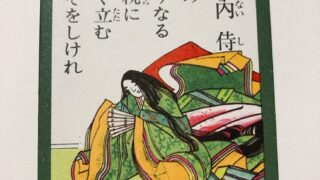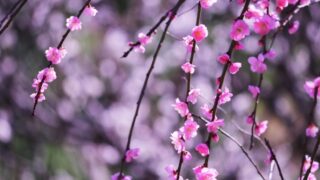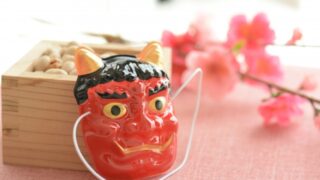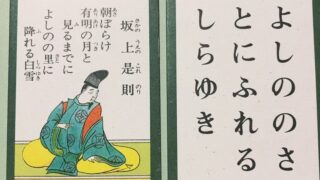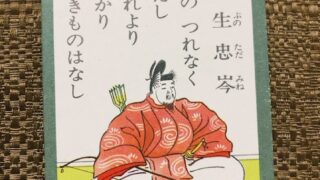3月8日は国際女性デーでした。みなさん楽しく過ごせましたか。今日は日本の偉大な女性作家、紫式部の歌を紹介します。
March 8 is International Women’s Day. I hope everyone had a good time. Today, I would like to introduce a poem by Murasaki Shikibu, a great Japanese woman writer.
| 偉大な | いだいな | great |
| 女性作家 | じょせいさっか | woman writer |
| 紫式部 | むらさきしきぶ |
めぐり逢ひて 見しやそれとも わかぬ間に 雲がくれにし 夜半の月かな
紫式部 (9??-10??)
百人一首 五十七番
新古今和歌集 雑
むらさきしきぶ
ひゃくにんいっしゅ ごじゅうしちばん
しんこきんわかしゅう ぞう
かな
めぐりあひて みしやそれとも わかぬまに くもがくれにし よはのつきかな
「あひて」は「あいて」、「よはの」は「よわの」と読みます。
言葉の意味
| 巡りあひて | めぐりあって | meet by chance |
| 見しや | 見たものが | what I saw |
| それともわかぬ間に | それと判断できない間に | before I could not knew it |
| 雲がくれにし | 雲にかくれてしまう | hide behind the clouds |
| 夜半の月かな | 夜中の月ですね | The Moon late at night |
現代語訳
ひさしぶりに会えたのに、あなたかどうかもわからないうちに、帰ってしまうのですね。すぐ雲に隠れてしまう月のようです。
It’s been a long time since I’ve seen you, but you leave before I even know if it’s you. It’s like the moon that soon hides behind the clouds.
この歌は恋の歌ではなく、友だちに向けた歌です。
紫式部は20代の時に、父親の仕事のため、都を離れて住んでいました。ひさしぶりに友だちが訪ねてきたのですが、じゅうぶん話す時間もなく、帰ってしまう。楽しい時間は早く過ぎてしまいます。今とは違って、電話もなく、手紙も簡単に送れない時代です。さびしかったでしょうね。すぐ帰ってしまう友だちを、雲に隠れる月に例えて詠んだ歌です。
This poem is not a love song, but a song for a friend.
Murasaki Shikibu was in her twenties when she lived away from the capital due to her father’s work. A friend visited her for the first time in a long while, but she left without having enough time to talk. The good times go by fast. Unlike today, there were no telephones and letters could not be sent easily. It must have been very lonely. This poem compares the friend leaving soon after to the moon hiding in the clouds.
| 隠れる | かくれる | hide |
| 都 | みやこ | capital (old term) |
| AをBに例える | たとえる | A is linken to B |
紫式部・むらさきしきぶ
11世紀の有名な作家です。日本文学の最高傑作と言われている「源氏物語」を書いた女性です。
「源氏物語」は、美しい貴族の男性、光源氏と、その男性の周りにいた女性達の物語です。とても華やかな物語です。多くの女性が登場しますが、みなとても魅力的です。ひとりひとりの女性の気持ちや、思い通りにならない人生のつらさが、とても丁寧に描かれています。
She is a famous writer of the 11th century. She wrote “The Tale of Genji,” considered one of the greatest works of Japanese literature.
The Tale of Genji” is the story of a beautiful aristocratic man, Hikaru Genji, and the women who surrounded him. It is a very glamorous story. Many women appear in the story, and they are all very attractive. The feelings of each woman and the hardships of a life that does not turn out the way they want are very carefully depicted.
| 日本文学 | にほんぶんがく | Japanese literature |
| 最高傑作 | さいこうけっさく | the greatest work |
| 源氏物語 | げんじものがたり | The Tale of Genji |
| 貴族 | きぞく | aristocrat |
| 物語 | ものがたり | story |
| 華やかな | はなやかな | gorgeous, brilliant |
| 登場する | とうじょうする | appear |
| 思い通りにならない | おもいどおりにならない | ~ don’t turn out the way one wants |
| 魅力的な | みりょくてきな | charming |
| 丁寧に | ていねいに | carefully |
11世紀に書かれた物語ですが、登場人物の気持ちは、今を生きる私たちにも伝わってきます。そして、1921年に初めてイギリス人のアーサー・ウェイリーによって英語に翻訳されて以来、今では32か国の言語に翻訳されています。2000年以上も昔の物語が時と国を越えて愛され続けています。
Although the story was written in the 11th century, the feelings of the characters can be felt by those of us living today. Since it was first translated into English by Englishman Arthur Waley in 1921, it has now been translated into 32 languages. 2000-year-old-tale continues to be loved across time and countries.
「源氏物語」は大和和紀という女性によって、漫画化されています。「あさきゆめみし」という作品です。絵が美しく、当時の習慣がとてもわかりやすく伝わってくる作品です。タイトルの「あさきゆめみし」は、昔の歌からとったものです。今の言葉で「浅い夢など見たくない」という意味だと言われています。
”The Tale of Genji” has been adapted into a manga by Waki Yamato. It is the work named “Asaki Yumemishi. Her illustrations are beautiful and the customs of the time are conveyed very clearly. The title “Asakiyumemishi” is taken from an old poem. It is said to mean “I don’t want to have shallow dreams” in today’s language.
日本の学校では中学と高校で古典を勉強するので、10代の時にこの作品を読んだという人が多いです。私は高校生の時にこの作品を読みました。友だちとどの女性が好きかとか、登場人物の性格や魅力について話し合ったりしました。英語で書かれているバイリンガル版もあるので、興味があったら、試してみてください。
Japanese students learn classics in junior high and high school in Japanese schools, so many of them read this manga to understand “The Tale of Genji” when they were teenagers. I read this work when I was in high school. My friends and I would discuss which woman we liked best and the personalities and charms of the characters. There is a bilingual version written in English, so if you are interested, give it a try.
令和六年三月九日






